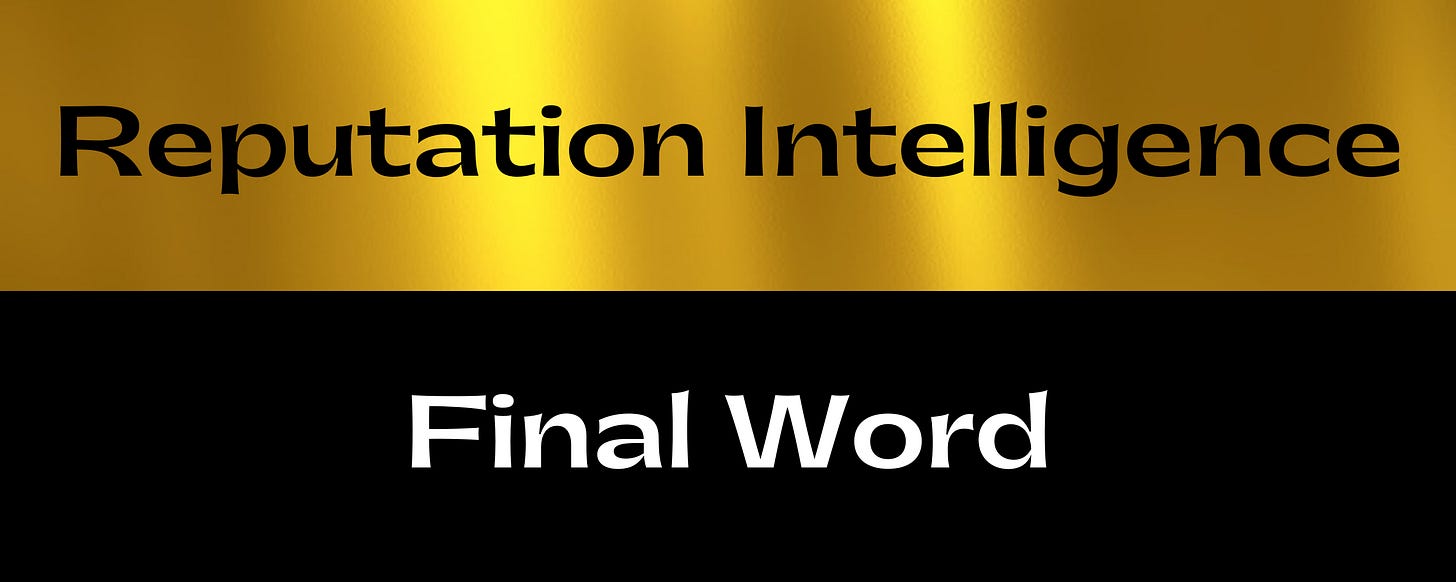Responding Expertly and Impressively to Constructive Criticism
Earning reputation capital from this skill
Criticism, even if its intent is to be constructive, isn’t palatable for most people. How we make ourselves respond to it goes a long way towards further determining whether we show our best selves to other people and build reputation capital or instead, regrettably, self inflict additional damage on our name and life.
It helps to understand why any suggestions, recommendations or mandates for change can hurt us emotionally and psychologically.
"Constructive criticism,” Sarah Porter, Ph.D., told Beth Ann Mayer for Mayer’s article at Parade.com, 17 Phrases To Respond to Constructive Criticism, According to Psychologists, “can shake our sense of self, confidence and safety.”
It knocks us off emotional balance.
"Our nervous system goes into overdrive if we feel under attack,” Porter says.
We can practice to develop and fine tune poise and a skilled, intelligent response.
"When responding to constructive criticism, it's important to choose your words wisely because you cannot unsay them," says Dana Harron, PsyD, a licensed clinical psychologist. "It's important to choose language that makes it clear that you understand and care about what has been said."
That is absolutely wise advisory by Harron. The reality is most people react poorly instead of forcing themselves to — or otherwise calmly, positively and sincerely — responding.
In this article, I will briefly go over many but not all of the recommended communication replies to constructive criticism from the Mayer’s Parade.com article.
"Thanks for sharing your thoughts with me." This can be received well by the person offering the criticism but only if it is expressed with a sincere tone of voice, interest in learning and real consideration to making adjustments.
"It seems you're telling me X, Y and Z. Do I have that right?" This is a clunky reply in my professional opinion yet it can work if you stress the, “Do I have that right?” as a question and it is done in a civil manner.
"I’m open to hearing how I can improve, and I value your perspective." This is a winner because it communicates that you care, are flexible enough to change, can take the criticism “hit” and are showing respect with your words.
"This is hard for me to hear, but I appreciate you bringing this to my attention." Another winner, if this is truly how you feel, because it admits your emotions, shows honesty of vulnerability and exhibits appreciation for learning what they thought you needed to know.
"I really value your take on this, and I’d like to offer some context." This might come across as defensive and create further issues. If you feel it is necessary to communicate this sentence, do so, yet be careful of tone of voice and talk about what you agree about first and then, in addition, the context you’d like to offer.
"I appreciate you sharing this feedback with me. Is it OK to have regular check-ins to discuss other ways I may improve?" I think the other person or people would look at you with complete disbelief, yet they would be positively surprised. Why? Someone saying ‘Thank you’ (and meaning it) after receiving criticism, even if constructive, is not common. Asking to have regular check-ins to learn more ways to improve is going to leave people stunned yet respectfully, impressively so, especially if you really invest in improving right now and thoroughly with adjustments and corrections.
"Let’s put our heads together to figure this out." Maybe people will be agreeable to this because they get to tell you what they would like yet they might not want to collaborate, as in hear what you have to say, assuming you will want to do something other than what they believe should be done.
"I need time to think about what you've said." If you feel triggered by the constructive criticism, communicating this sentence is better than any reactive aggressive or passive-aggressive behavior. Say it with poise and respect and really get back with them in short order to communicate.
Communicate in a poised, intelligent and wise manner in the face of constructive criticism and then make prompt, full, sustained corrections and you will continue to build strength of positive reputation and the “capital” that goes with it. That’s beneficial.
You will respected and admired for it, be given the benefit of the doubt in most all situations and prove yourself unique and trustworthy.
Michael Toebe is a reputation consultant, advisor and communications specialist at Reputation Quality, assisting individuals and organizations with further building reputation as an asset or ethically protecting, restoring or reconstructing it.
Subscribe for free or become a paid subscriber to receive and access “extras,” whichever works best for you.





